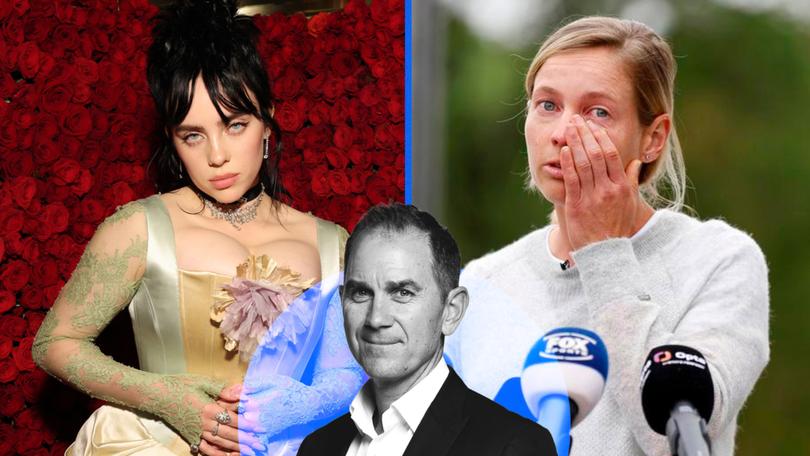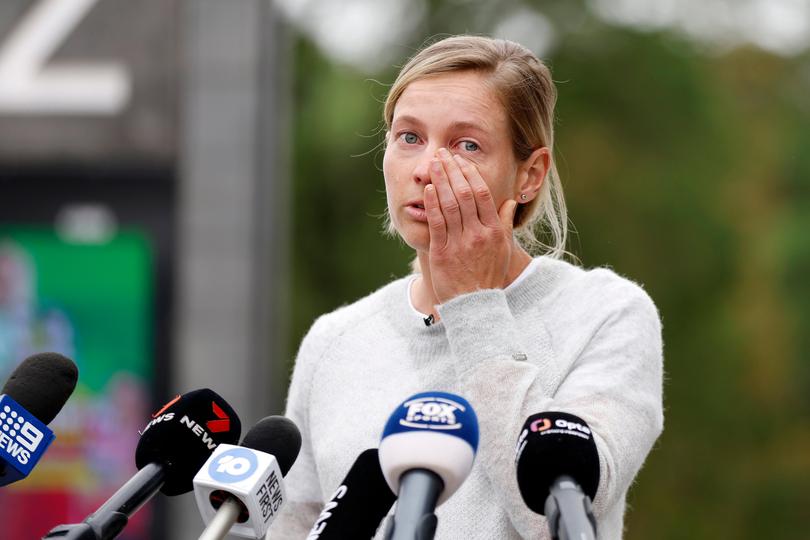JUSTIN LANGER: What Billie Eilish, Meg Lanning and Ian Thorpe have taught me about better mental health
JUSTIN LANGER: What I learnt from a singing superstar and a cricket champion about fighting our inner demons and how that helps me teach my team to handle adversity.

Billie Eilish is a young American singer-songwriter who is known for her dark, atmospheric sound and introspective lyrics. At just 22 she is very rich, very popular and has gained critical acclaim, having won multiple Grammy Awards.
My youngest daughter Gracie introduced her music to me on our school runs a few years ago, and while I have found her songs to be very deep, her lyrics can be profound, and I am in awe of her talent.
This week she announced a world tour which includes Australia, and while I was searching to see if she was playing in Perth, (unfortunately not this time — she was brilliant here in 2022), I came across an interview of hers in the Rolling Stone magazine.
Sign up to The Nightly's newsletters.
Get the first look at the digital newspaper, curated daily stories and breaking headlines delivered to your inbox.
By continuing you agree to our Terms and Privacy Policy.In it, and through her music, she opens up about her struggles with mental health and dealing with depression, anxiety, and body-image issues.
Her honest and vulnerable approach to discussing these topics resonated with me as I deal with young people every day as a coach, mentor, parent, writer, and speaker.
Reading the Rolling Stone interview the words that flew off the page were when she referred to her major bout of depression last year.
“My whole life, I’ve never been a happy person, really,” she said. “I’ve been a joyous person, but not a happy person. I experience joy and laughter and I can find fun in things, but I’m a depressed person.”
Last year she said: “I have impending doom feelings most of the day. When I think too much about it, how I can ever have privacy again, it’s enough to make you want to do all sorts of crazy things. But you have to let it go.”
Psychiatrists, doctors, and psychologists around the world must hear these words regularly, but when I read them from a pop icon this week, they reminded me that rich or poor, famous or not, everyone has their struggles to deal with.
Eilish’s honesty coincided with a ‘Howie Games” podcast I listened to on Wednesday night as the brilliant Mark Howard interviewed one of my all-time favourite athletes Meg Lanning.
Meg is a supreme cricket talent, whose record as a captain and player is as good an any Australian athlete. She led Australia to five World Cup titles — four T20s and one ODI World Cup. Putting this into perspective, no other captain (male or female) has won more than two World Cups.
A quiet, introverted person, Meg commands instant respect the moment you meet her. Her cricket statistics are unrivalled.
Last year Meg shocked the sporting world when she retired from international cricket. After leading Australia to another Twenty20 World Cup title she suddenly pulled out of last year’s Ashes for undisclosed medical reasons.
I say “suddenly” but when you listen to her talk, what may have seemed sudden to the masses, must have been more like a built-up relief to the superstar sportsperson.
Meg talked of “an unhealthy relationship” with exercise and food. Living in a very public world, the self-described ‘private person’, must have been living a nightmare, wearing a mask to hide the private battles.
Talking to Mark Howard, Meg said: “It sort of just spiralled. It was just all out of whack, and I kept sliding. At some point, it’s got to stop. I felt very out of control in terms of what my future looked like.
“I dreaded night-time because I knew I would go to bed and not be able to sleep. That would make me so mad. I would just get more angry with myself. If you can’t sleep, you can’t do anything.’’

After hearing this I could picture all those people out there thinking: “Oh my God sister, I know exactly how you feel. I know just what you’re going through. It’s a nightmare, isn’t it?’
Another Australian sporting icon has been very public about his battles with depression.
Swimming champion Ian Thorpe has said: “As a teenager, I was struggling with my own mental health and the feeling that I was not able to fit into this world. Even in the lead-up to some of my greatest accomplishments in the pool, I was struggling as an individual to be able to just succeed at normal life.”
He concedes that at the time, the only coping mechanism he had was his swimming.
“Doing countless laps in the pool may seem mundane to everyone else, but for me it was like making music,” he said. “I loved it. It was a release for me. What my swimming coaches saw as me trying to improve my efficiency, was actually me improving my own mental health.”
Only this week I have had to counsel four young superstar athletes on different matters.
The first one was about turning off from the noise of social media trolls. My message was that in this business of professional sport, the more we concentrate on what we love the better life will be.
I encouraged this young athlete that the other stuff is just noise which takes courage, skill, and wisdom to eliminate. If you can keep laughing at the noise and the critics — trusting the truth — you will be far better off than getting angry or sad about it.
The second person was Mayank Yadav, a young Indian fast bowler who has made headlines around the world because he is bowling as fast as anyone has for years.
Reaching breath-taking speeds he went from an unknown youngster with potential, to a household name here in the Indian cricket world. His social media world went from thousands to hundreds of thousands within a week.
Sadly, he was struck down again by injury on Tuesday night. After a strong rehabilitation he re-injured the area that he had been working on.
Unfortunately, injury is a curse of his craft, but the result is more time in the rehab centre, missed opportunities to play the game the loves, and the chance put his name up for international selection.
He is devasted, but like the battles of ‘never having privacy again’, while he is in this business, injuries are a challenge he must overcome and deal with, if is survive and realize all his dreams.
The same day Mayank injured his side, two more of my Lucknow Super Giants found out that they had missed out on selection for the Indian T20 World Cup squad. Not only do they have to deal with the disappointment of their non-selection, but they will also be exposed to the opinions — positive and negative — of whether they should, or shouldn’t be on the plane to take on the world’s best.
Having walked in their shoes many times before, the best you can do is encourage them to keep standing tall, remain focused on their performance, and again, smile in the face of other’s opinions, so they don’t have to experience that sinking feeling of elimination ever again.
What I see daily in my personal and professional life, is people dealing with their own challenges.
This is just a part of living your life. Each challenge varies from person to person, and they are no less significant when you are living your way through them.
Whether I am talking to my players, my kids, or strangers, my advice is always the same. Having the courage to accept your vulnerabilities and recognise that at times it’s OK not to be OK, is important.
Equally, acknowledging any issues that may be disturbing your peace and happiness, can start you on your road to peace and happiness. Letting go of our ego and dropping the mask is a crucial step forward.
Establishing a strong support network of family and friends — the right people who you can reach out to who you will know will make a difference — is also critical to your well-being.
Like Eilish we all might have “impending doom feelings most of the day”, or even some of the day, but knowing we are not alone can provide us with some solace and a way out of the gloom that sometimes hangs like a dark shadow over our happiness.

